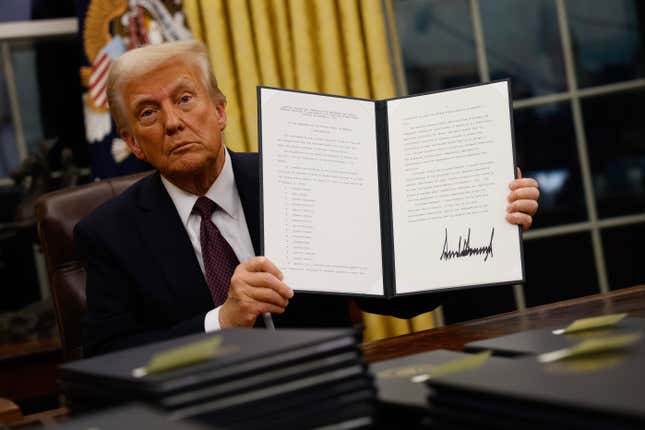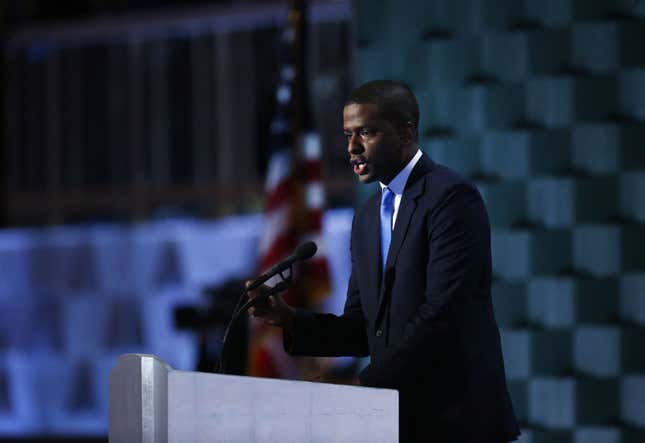
As expected, President Donald J. Trump has signed a slew of executive orders undoing decades of hard work people had put in to establish equity and protections from discrimination. The latest signature he gave in his rampage against DEI, however took a serious blow to the Equal Employment Opportunity Act (EEOA) of 1965.
The Root spoke with Bakari Sellers, attorney, CNN political commentator and son of civil rights leader Dr. Cleveland Sellers, about the impact of Trump’s executive order. From his point of view, it’s a strong indication these next four years are not going to look good for Black federal workers.
What is Executive Order 11246?
After the Equal Employment Opportunity Commission was formed by the Title VII of the Civil Rights Act of 1964, Lyndon B. Johnson signed an executive order enforced by the Department of Labor to prohibit discriminatory employment practices across federal contractors.
While the overarching civil rights legislation focused on the right to vote and equal access to public services, Johnson’s Executive Order No. 11246 was pivotal for its charge of the Secretary of Labor to handle the responsibility of ensuring the prohibition of discrimination of race, creed, color or national origin for hopeful federal employees. It also required contractors to take affirmative action to ensure equal opportunity was executed and called for the EEOC and DOL to collaborate in investigating any violations of Title VII.
As a result, we saw agencies from education to law enforcement addressing the severe lack of Black and brown faces in their populations by examining whether their hiring and disciplinary processes were discriminatory.
Trump’s War on “Illegal DEI”
In a briefing released from the White House earlier this week, and in perfect anti-woke fashion, Trump used his executive powers to “terminate illegal discrimination in the federal government” by declaring Johnson’s order to be revoked.
“Illegal DEI and DEIA policies not only violate the text and spirit of our longstanding Federal civil-rights laws, they also undermine our national unity, as they deny, discredit, and undermine the traditional American values of hard work, excellence, and individual achievement in favor of an unlawful, corrosive, and pernicious identity-based spoils system,” the briefing reads in part.
The President says that policies promoting diversity and inclusion (or divisiveness and chaos as Trump believes) are direct violations of our civil rights laws. The irony has not been lost on critics who say the very policies to ensure our civil rights are protected, Trump believes should now be deemed … illegal.
“I think you have to realize that first the reason [the Equal Employment Opportunity Act] was put in place is because of an unequal and uneven playing field. When you look at the totality of it,’’ said Sellers. “ you recognize that this puts these workers at a unique disadvantage - that disadvantage is gonna play its way out in a much less diverse workforce.”
What Does All of This Mean?

Sellers, former South Carolina state representative, told The Root the reason it seemed so easy for Trump to wipe away discrimination protections with the swipe of a pen is because these rights have been vulnerable since they were enacted.
“Part of the problem is when we’ve had leadership since LBJ - when we had the Clintons, when we had Obama - we took for granted that somebody like Donald Trump would ever come and take us back to 1965 instead of codifying any of these things. There’s no reason this wasn’t codified prior to but here we are,” Sellers said. “‘Make America Great Again’ means ‘Make America 1960.’”
Essentially, other civil rights legislation that hasn’t been codified by Congress, or solidified into a statute that would therefore be protected from being overturned by an executive order, are also in jeopardy of Trump’s wrath. For example, if abortion rights were codified under Roe v. Wade , they would not have been so susceptible to being rolled back by the president. Sellers tells us that while Trump does not hold all power in his pen, even with pushback, Trump still has the upper hand.
“Even just trying to end birthright citizenship with a pen, you have a great deal of pushback. You’re going to have a court ruling. This is going to be fought in the court of law. The problem is that because [Trump] has reshaped the court after his win 2016, he’s reshaped the court for years to come,” Sellers said.
When asked what the people could do to offset Trump’s executive tirade, Sellers said they had the opportunity back in November but... here we are.

